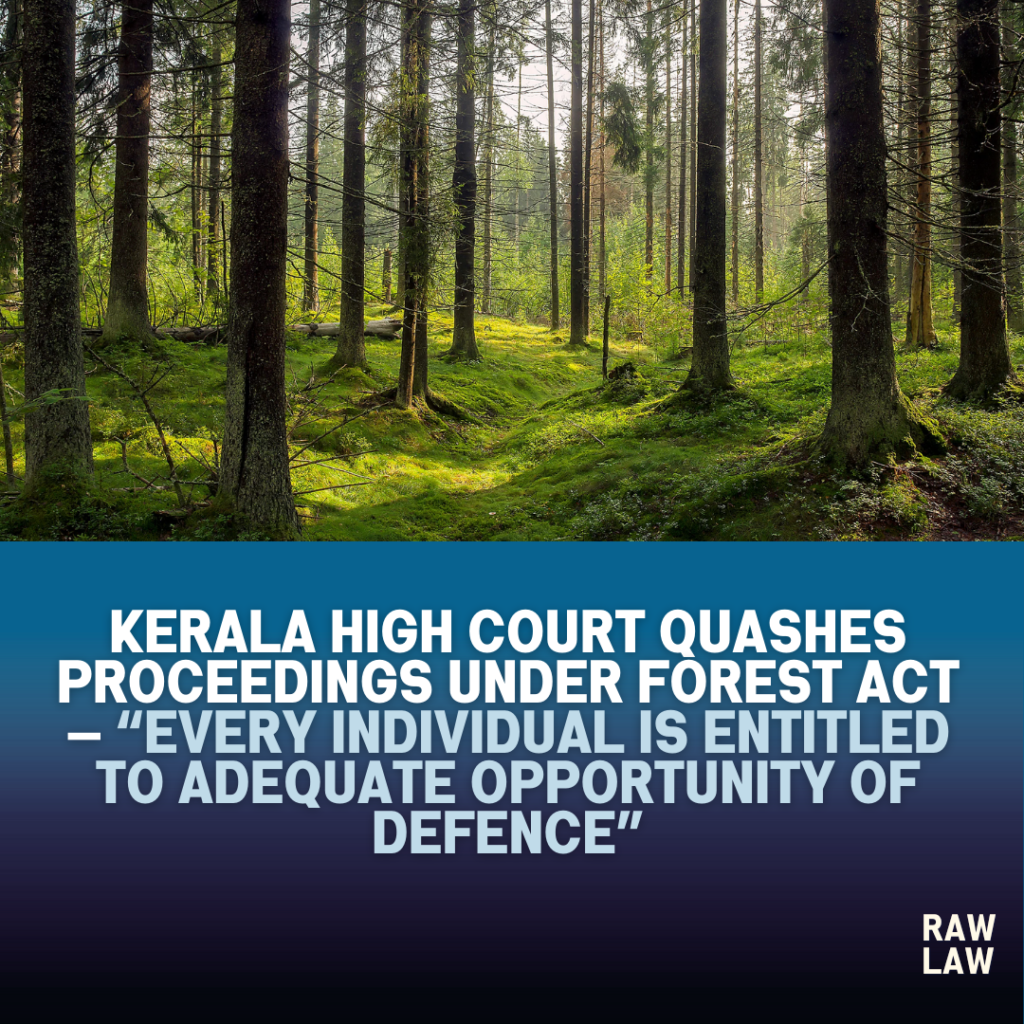Court’s Decision
The Kerala High Court set aside the order of the trial court that had convicted the accused under the Kerala Forest Act and Wildlife Protection Act. The Court emphasized that “every individual is entitled to adequate opportunity of defence” and found that the prosecution failed to establish guilt beyond reasonable doubt. The proceedings were quashed on the ground that the accused had not been afforded a fair trial and the prosecution evidence suffered from significant deficiencies.
Facts
The prosecution alleged that the accused was apprehended in possession of forest produce without lawful authority. The forest officials claimed to have seized the contraband material and produced it before the competent authority. Based on this, charges were framed under the provisions of the Kerala Forest Act and the Wildlife Protection Act.
The trial court convicted the accused and imposed punishment. On appeal, the conviction was challenged on grounds of lack of reliable evidence, failure of prosecution to prove ownership or origin of the seized items, and violation of procedural safeguards. The defence argued that the entire case rested on the testimony of forest officials without corroboration.
Issues
- Whether the prosecution had successfully proved that the seized material was forest produce as defined under the Kerala Forest Act.
- Whether the accused was given a fair opportunity to defend himself during the trial.
- Whether the conviction could stand in the absence of independent corroborative evidence.
Petitioner’s Arguments
The petitioner argued that the trial court wrongly relied solely on the statements of forest officials without independent witnesses or scientific confirmation regarding the nature of the seized goods. He contended that the seizure itself was doubtful and no independent evidence was adduced to support the prosecution story. Furthermore, it was argued that the accused had been denied adequate opportunity to cross-examine crucial witnesses and present his defence. This, according to the petitioner, amounted to a denial of natural justice.
Respondent’s Arguments
The State contended that the seizure was lawful and made by authorized forest officers in the presence of witnesses. It was argued that official witnesses are competent and reliable, and their testimony should not be discarded merely for lack of independent corroboration. The prosecution maintained that the trial court had rightly appreciated the evidence and convicted the accused. The State further contended that the procedural irregularities, if any, were minor and did not prejudice the accused.
Analysis of the Law
The Court closely examined the provisions of the Kerala Forest Act, which places the burden of proof on the prosecution to establish that the seized materials are indeed forest produce and that the accused was in illegal possession. The Court reiterated that mere suspicion or uncorroborated testimony of officials cannot be the sole basis of conviction.
The principle of natural justice requires that an accused be given full opportunity to cross-examine witnesses and challenge the prosecution case. Failure to adhere to these safeguards vitiates the proceedings.
Precedent Analysis
The Court relied on several precedents to highlight the importance of fair trial and corroborative evidence:
- State of Kerala v. P. Valsalan – held that official testimony without corroboration must be scrutinized with caution.
- K.T. Varghese v. State of Kerala – emphasized that denial of cross-examination amounts to violation of natural justice.
- Supreme Court’s observation in Sharad Birdhichand Sarda v. State of Maharashtra – reiterated that suspicion, however strong, cannot substitute proof.
These authorities were used to reinforce that the conviction could not be sustained when the prosecution failed to discharge its burden.
Court’s Reasoning
The Court noted that the trial court failed to ensure compliance with basic principles of fair trial. The accused was not given sufficient opportunity to contest the prosecution’s claims. The forest produce was never scientifically identified, nor was independent testimony led to establish seizure. The Court observed that when liberty of an individual is at stake, the courts must adopt a cautious approach and require clear and convincing evidence. The failure of the prosecution to produce independent corroboration or allow proper cross-examination rendered the conviction unsafe.
Conclusion
The Court quashed the conviction and set aside the sentence imposed by the trial court. It held that the prosecution had failed to establish guilt beyond reasonable doubt and that the accused was denied a fair trial. The judgment underscores that fairness and adherence to natural justice are paramount in criminal proceedings.
Implications
This ruling reinforces the principle that convictions under the Forest Act and similar statutes cannot rest solely on official testimony without independent corroboration. It highlights that procedural safeguards and fair trial rights cannot be compromised, even in environmental or forest-related offences. The decision will guide lower courts to strictly adhere to the principles of natural justice and insist on reliable evidence before convicting an accused.
FAQs
Q1: Can a conviction under the Forest Act be based solely on forest officers’ testimony?
No. The Court held that such testimony must be corroborated by independent evidence; otherwise, the conviction cannot stand.
Q2: What happens if an accused is denied the chance to cross-examine prosecution witnesses?
Such denial amounts to a violation of natural justice, rendering the trial invalid and liable to be quashed.
Q3: What principle did the Court emphasize in this case?
The Court stressed that “suspicion, however strong, cannot substitute proof,” and every accused is entitled to a fair trial with adequate opportunity of defence.



